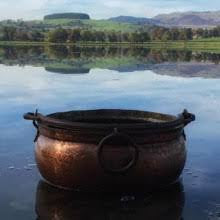Let's talk about the Dagda, Irish God of Hearth and Home...



There are many amazing and wondrous things to learn about the Dagda. It can be hard to know where to start. Hopefully we can give some insights on that here.
The record of ancient Ireland’s mythology comes from a number of sources, but by far the most common and detailed record we have are the handwritten manuscripts, beautifully crafted by the earliest of the Christian monks who set up on the island. One of the oldest texts dates to the 11th century, and therein records some of the stories of the indigenous people’s oral traditions.
The segment we need to look at to find our titular character is known as Lebor Gabála Érenn, which can translate as ‘The Book of the Takings of Ireland’ or, maybe more aptly, ‘The Book of Invasions’. This text is found in both the Book of Leinster and the later Book of Fermoy. It is one of the core sources of the mythological cycle stories in Irish literature, including (in various versions) both the first and second battles of Moytura (Cath Maige Tuired). It also constitutes one of the earliest known histories written by the Irish.
Amongst the Tuatha Dé Danann we first hear of this “good god of druidry and wisdom”. When we say ‘Good God’; we don’t mean morally good. We mean good at everything. We are presented with this powerful figure, a champion and chieftain to his people. Indeed he is one of four entrusted to bring their greatest treasures to Ireland. The Dagda is said to have brought from Murias the Cauldron, an coire ainsic, “from which no company ever left unsatisfied”.
According to the stories, many powers does our Dagda possess; from the champion’s skills, the king’s virtues of right judgment, the builder’s craft, to the true harper’s skill of the three strains; music that would make the listener joyfully dance and sing, woefully weep and grieve, then restfully sleep and recover. With his harp, an coir cetharchuir, he even had the ability, the authority, to set the seasons in their right order.
When death falls upon one of his many children, we see a grieving character driven beyond his own healing arts, to a quest out of the land of Ireland in search of a method to restore life to that which is dead. The Dagda takes up the power of an Lorg Mór, the great club/staff which *"has a smooth end and a rough end. One end slays the living, and the other end brings the dead to life."
The Irish God secures his command over life and death by giving a guarantee. He offers the powers and knowledge of the land, the sea, and the sky, control over the sun, the moon. The Dagda has power over all of creation. For all of this power and ability though, the Dagda is forever bound to the right words of legal justice, his fair balanced service to his people, and the care and well being of his children.
Often confused with other Celtic Gods like Cernunos or Sucellus, the Dagda Mór is uniquely Irish in origin and is as influential in the Irish pantheon as Odin in the Norse gods or Zeus among the Greek gods. He is the brother of Oghma; the wedded partner of the Mórrígan; and the lover of Bóann, for whom the river Boyne is named.
As we follow the stories of this god, this multi-faceted jewel of deity and indeed allegory, we will begin to understand so much more than first meets the eye of the beholder. Source of practical wisdom, an inspiration of spiritual and creative practices, and maybe even, in some ways, an example to set one's life to.
Want to know more about the Dagda? Take a course HERE at the Irish Pagan School. Check out this BOOK Harp, Club and Cauldron, or follow me on Patreon for monthly Dagda stories.
*Bergin, Osborn. "How the Dagda Got His Magic Staff." Medieval Studies in Memory of Gertrude Schoepperle Loomis. NY: Columbia University Press, 1927.
